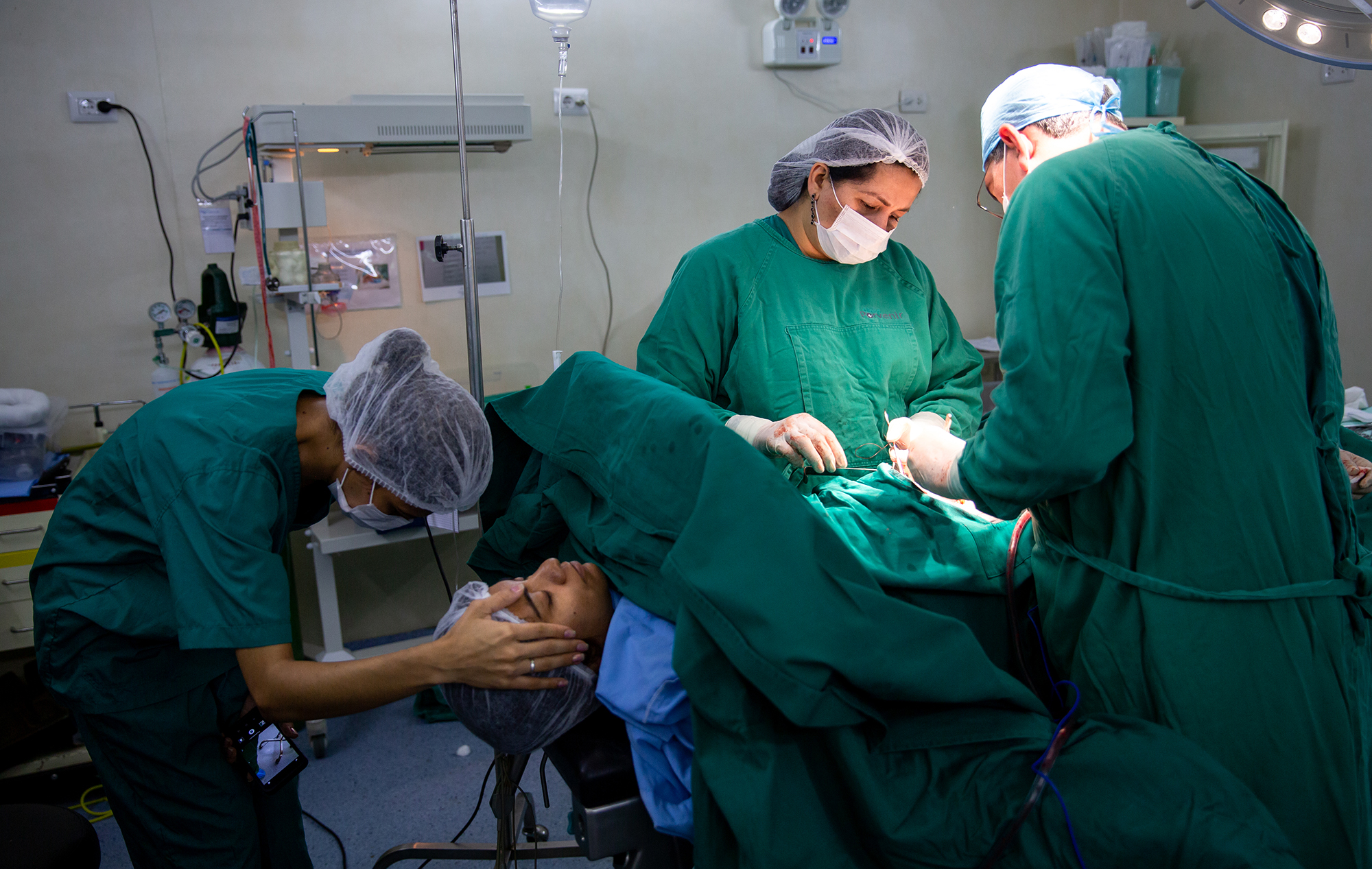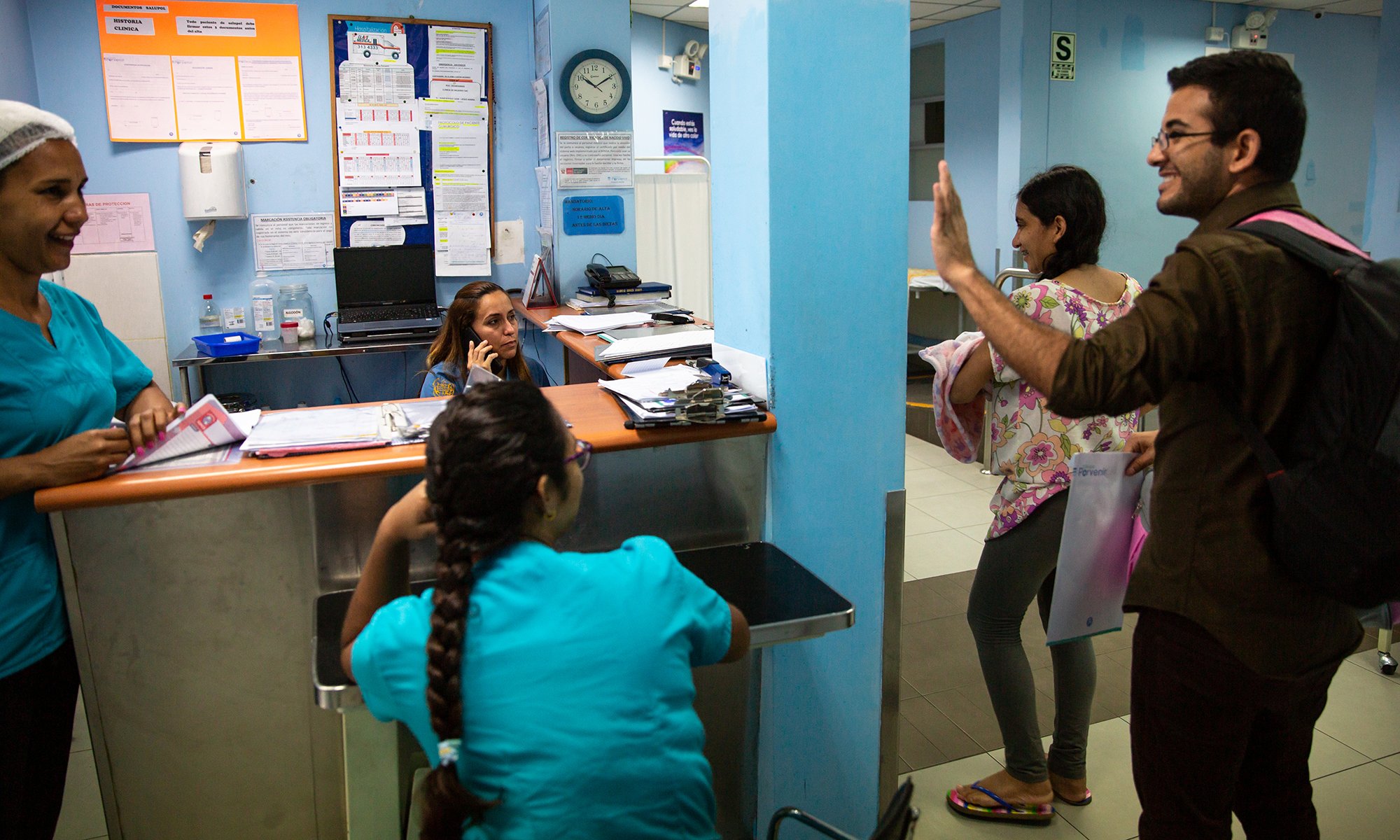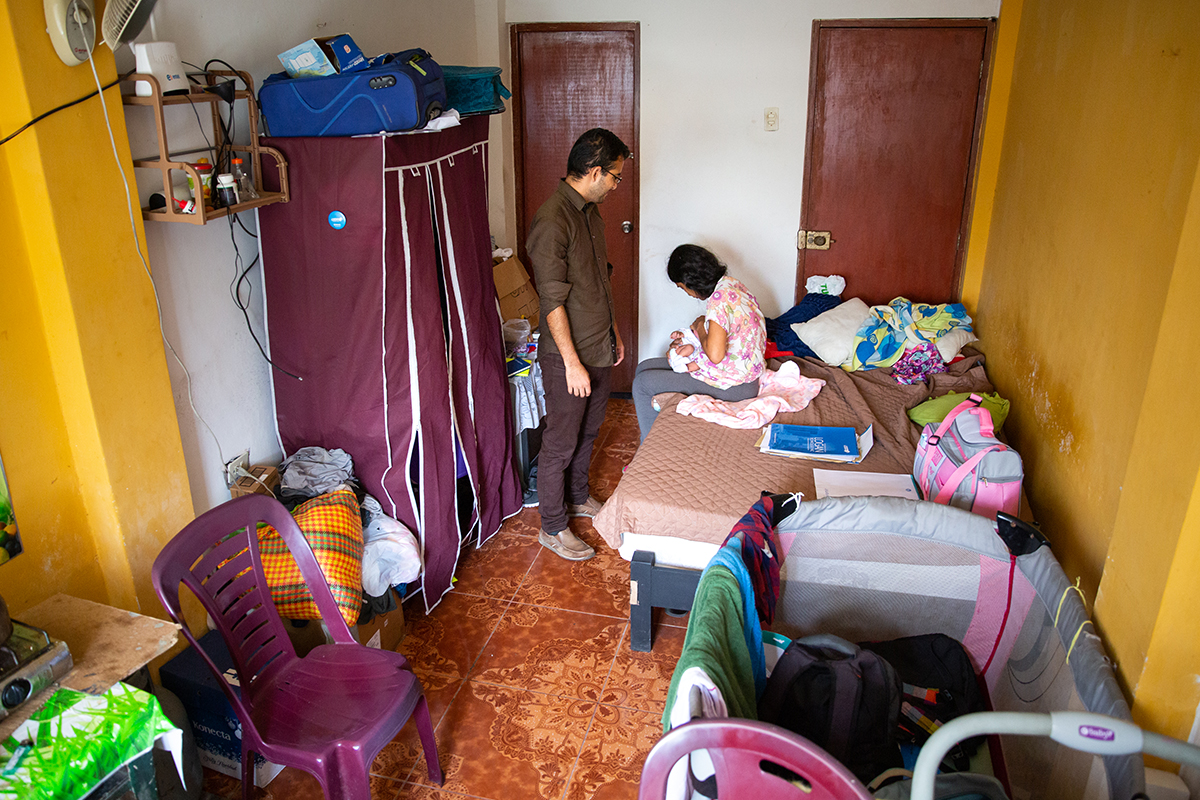
Drs. Heydi Coronel and José Luis Goncalves perform a C-section on Nersis Arrieta as Arrieta’s cousin, Keyla Rodríguez, caresses her face. Coronel and Arrieta were doctors in Venezuela, but Arrieta hasn’t yet been given permission to practice medicine in Peru. (Photo by Anya Magnuson/Cronkite Borderlands Project)
A child of two nations: Hope for ‘democracia’ in Peru spurs new parents
LIMA, Peru – The decision to leave was almost inevitable. Nersis Arrieta and Edil Aguilar had lived through the shortages, the canceled university classes, the throttling of political dissent, the grim economic reality of Venezuela. They were married and hoped for children.
But as a doctor, Arrieta had seen the vaccine shortages, the lack of medicine and the absence of basic sanitary supplies firsthand. She and her husband wanted their child to be born safely. They wanted their child to be born “en la democracia,” as Aguilar said.
When the couple left their troubled country in January 2018, they packed their lives into three suitcases and sold the rest of their possessions to buy bus tickets for their six-day trip to Lima, where they joined hundreds of thousands of Venezuelans starting new lives.
They spent the first month with family members who had immigrated the year before. Arrieta started the long process of trying to get her medical credentials recognized in Peru. Aguilar found a job in a call center. Less than six months after arriving in Peru, Arrieta became pregnant.
The couple found a doctor who was willing to waive his delivery fees, cutting the cost of the birth significantly. Aguilar saved his wages from a call center job, gathering just enough money to pay for the Cesarean section that Arrieta would need. On the day of the surgery, there were three doctors in the room: Arrieta and the two performing the operation. All were Venezuelans.

As a favor to fellow Venezuelans, Dr. José Luis Goncalves waived his doctor’s fees for Nersis Arrieta's C-section. His wife had taught Arrieta at the Universidad Centroccidental Lisandro Alvarado in Venezuela. Arrieta graduated with a degree in medicine in December 2017; the process took 10 years instead of six because lack of resources forced the university to halt classes periodically. (Photo by Anya Magnuson/Cronkite Borderlands Project)

Elisangela Aguilar squalls after her delivery by C-section as doctors clean the infant and prepare to cut her umbilical cord. (Photo by Anya Magnuson/Cronkite Borderlands Project)

Keyla Rodríguez snaps a photo as her cousin gets her first look at her daughter, Elisangela. (Photo by Anya Magnuson/Cronkite Borderlands Project)

Elisangela Aguilar weighed 7 pounds and 4 ounces when she was born on March 2. The infant also received tuberculosis and hepatitis B vaccines. Her mother, who was a doctor in Venezuela, said the lack of vaccines in Venezuelan hospitals is one reason she and her husband left in January 2018. "We did not want to have a baby in Venezuela due to all the medical shortages, such as vaccines and baby formula," said Edil Aguilar, the baby’s father. (Photo by Anya Magnuson/Cronkite Borderlands Project)

Keyla Rodríguez's children, Keidly Sofía, 5, and Samuel David Jiménez Rodríguez, 8, wait outside the delivery room at the Clínica Porvenir in Lima. When Nersis Arrieta, Keyla's cousin, and her husband arrived in Peru in January 2018, they stayed with the Jimenez Rodríguez family for a month before finding their own place. (Photo by Anya Magnuson/Cronkite Borderlands Project)

Two-day-old Elisangela Aguilar grasps her father's finger as she lies in in a bassinet at the Clínica Porvenir. Her father, Edil Aguilar, said the family had to save for five months to pay the bill, which was about $900. "And that was a good price because Dr. Goncalves did not charge us for his personal fees," Aguilar said. (Photo by Anya Magnuson/Cronkite Borderlands Project)

Nersis Arrieta received government-paid health care in Peru under a policy of providing care to those with "extreme situations," such as pregnancy. Although those benefits expired 43 days after Elisangela was born, but . because the baby is a Peruvian citizen, she has access to health care and other social services. (Photo by Anya Magnuson/Cronkite Borderlands Project)

New parents Edil Aguilar and Nersis Arrieta leave the Clínica Porvenir on March 4, after their daughter was born. The clinic charged 1,650 Peruvian soles, and the anesthesiologist charged 1,100. It took Aguilar five months to save the money working at a call center. (Photo by Anya Magnuson/Cronkite Borderlands Project)
Coming home
Two days after the surgery, the new parents returned to their small studio apartment in the working-class port city of Callao.
“We’re worried that she will grow up with discrimination,” Arrieta said, referring the increasing pushback against Venezuelan immigrants in Peru, whose numbers ballooned from 500,000 to more than 700,000 in just a few months.
For now, the couple is trying to cope with the immediate future. They’d like to move into a slightly larger apartment in a safer neighborhood. Arrieta plans to continue trying to get her medical license recognized in Peru — not a simple process.
They say they want to return to Venezuela but have no idea when that might be possible. For now, they’re focused on their healthy daughter and hoping for the future.

Nersis Arrieta would not have been able to have a C-section in Venezuela. Arrieta, who worked as a general practitioner at a hospital and several private clinics in Venezuela, said that even the hospital was no longer able to perform surgeries because of the scarcity of medication and basic supplies. “When (Venezuelan President Nicolas) Maduro came, everything began to disappear,” Arrieta said. “There were so many children suffering from malnutrition." (Photo by Anya Magnuson/Cronkite Borderlands Project)

"We wanted her born into democracy," Edil Aguilar, 31, said of his daughter. He and his wife packed three suitcases to move to Peru, two of which sit on the top of a wardrobe in their studio apartment. (Photo by Anya Magnuson/Cronkite Borderlands Project)

Aguilar has a Venezuelan degree in marketing and Arrieta has one in medicine. But transferring professional licenses and credits to Peru is a long process. The couple hope Arrieta can eventually work as a doctor in Peru. Before giving birth, she worked at a pharmacy in Lima. (Photo by Anya Magnuson/Cronkite Borderlands Project)















Leave a Comment
[fbcomments]